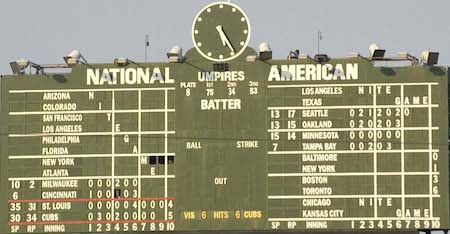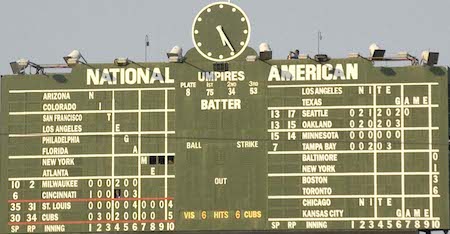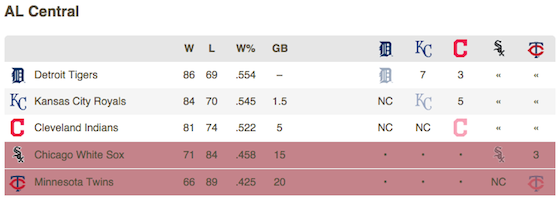
Dear Sports Fan,
What is the magic number in baseball?
Thanks,
Mike
— — —
Dear Mike,
The “magic number” is a calculation used to state how far a team is from achieving a goal. Most frequently, it’s a metric that show how close a team is to winning their regular season division or conference title, or to making the playoffs.
The term “magic number” is used in other sports as well as baseball, but these days, with the baseball playoffs quickly approaching, we’re seeing it most often in baseball news stories. Some recent examples are this article on The Detroit Sports Site which begins, “The Detroit Tigers’ Magic Number to clinch the AL Central stayed stuck on seven with Sunday’s loss in Kansas City.” or this article on SB Nation’s LA Dodgers blog, True Blue L.A., entitled, “MLB standings 2014: Dodgers and Giants both lose, magic number now 5.” There are websites devoted completely to following the magic number, like Playoff Magic. We’ll look at their Major League Baseball (MLB) section later. First, let’s talk about how the magic number works.
I find the easiest way of thinking about the magic number is that it is the number of games a team needs to win for them to achieve a goal no matter what another team does. This makes some intuitive sense. Let’s take a simple scenario. There are two games remaining in a season. My team, the Flywheels, is ahead of the Steampunks by two games in the standings. All I have to do is win a single game to make it impossible for the Steampunks to catch up. My magic number to end the season ahead of the Steampunks is therefore one. Let’s say though, that the Steampunks play one of their remaining games before our team, the Flywheels, does. If they lose, then they only have one game left and they are still down by two games in the standings. My magic number moves from one to zero. I don’t need to win any more games to assure myself that I’m going to finish the season ahead of my rivals. A team’s own result can change their magic number but so can another team’s win or loss. The magic number is a relative calculation.
In more complex situations, the magic number is harder to derive by instinct. Luckily, there are a few easy formulas to follow to calculate it. The best follows the logic of our previous example. It’s the second option on the Wikipedia entry about the magic number:
The magic number can also be calculated as WB + GRB – WA + 1, where
WB is the number of wins that Team B has in the season
GRB is the number of games remaining for Team B in the season
WA is the number of wins that Team A has in the seasonThis second formula basically says: Assume Team B wins every remaining game. Calculate how many games team A needs to win to surpass team B’s maximum total by 1.
Let’s use this formula on our example of the Flywheels and the Steampunks. We didn’t say how many games there had been in the season, only that there were two left. Let’s say it’s a 20 game season. The standings today look like this:
Team A: Flywheels – 12 wins, 6 losses, 2 games remaining
Team B: Steampunks – 10 wins, 8 losses, 2 games remaining
To calculate the Flywheel’s magic number, we take the number of wins the Steampunks have (10) add the number of games remaining for the Steampunks (2) subtract the number of wins that the Flywheels have (12) and add one to get… one! It works!
One important thing about the magic number that makes more sense when you see how it is calculated, is that it can only ever measure the distance between two teams. In a three way race for a division title, the leading team will have a magic number in comparison to each of the teams chasing them. If someone says that a team has a single magic number showing how far they are from achieving a goal, it’s safe to assume that every other team other than the one used to calculate that number has been mathematically eliminated from contention.
Returning to Playoff Magic’s MLB page, here’s one example of how the magic number is working in this year’s run to the baseball playoffs.
The AL or American League Central still has three teams in contention. The Tigers are in the lead with 86 wins after 155 games. The Royals are in second place with 84 wins after 154 games. The Cleveland Indians are running third with 81 wins after 155 games. There are 162 games in a baseball season, so the Tigers and Indians have seven games left while the Royals have eight. The magic number is most easily understood as how many games does a team need to win to stay ahead of the teams behind them even if they win every remaining game. If the Royals win all their remaining games, they’ll end the season with 92 wins. If the Indians win every remaining game, they’ll end the season with 88 wins. To end the season ahead of the Indians, the Tigers need to win a total of 89 games or three more than they have now. Tigers’ magic number vis-a-vis the Indians is three! To end the season ahead of the Royals, the Tigers would need 93 wins or seven more than they have now. Tigers’ magic number vis-a-vis the Royals is seven! Those magic numbers show up in the table on the Tigers’ row. The 5 on the Royals row in the Cleveland Indians column is the Royals magic number in relation to the Indians. In this case, the achievement is not winning the division but ending the season ahead of the Indians.
I hope that helps explain the magic number. In case you’re wondering what the GB means in the standings table, it stands for “games back.” Games back is another story completely but luckily, I wrote all about what “games back” means last year.
Thanks for the question,
Ezra Fischer


